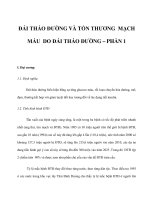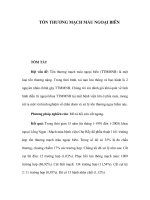Bóng phủ thuốc cho các tổn thương mạch máu dưới gối chúng ta đã biết những gì
Bạn đang xem bản rút gọn của tài liệu. Xem và tải ngay bản đầy đủ của tài liệu tại đây (1.71 MB, 31 trang )
Drug Eluting Platforms for
Below-The-Knee lesions:
What do We Know So Far?
Dr Cheng SC, MMed(Surg) FRCSEdin(Gen) FAMS
Consultant Vascular and Endovascular Surgeon
Adj Assistant Prof , National University Singapore
NOTHING MUCH CHANGED SINCE
2012
Why INTEREST in BTK Lesions
“Real-World” lesions in SEA
“Real-World” impact for SEA patients
60-70% of PVD work is BTK
20-30% at At Ankle
1st Presentation is Tissue Loss
Long healing time is required
A Schmidt et al Catheter Cardiovas Intervent
2010
58 CLI patients 62 limbs
Mean lesion length 183mm
Re-stenosis > 50% after 3 months 68.8%
Fernandez et al J Vas Surg 2010:52 834-42
111 CLI patients
1 year follow up
Duplex patency 33% <50% re-stenosis
Re-intervention rate 50%
Longevity is the main Issue
Stents answer a structural problem
Medications answer a re-stenosis
problem
Stents address a structural issue
Role of BMS in BTK post CTO Angioplasty Salvage
situation
Xu G, Tang ZH, Cheng SC ASVS Kyoto 2010
1 year period 12 Limbs (10 patients) out of 130 Limbs
Restenosis >50% on duplex/ DSA/CTA
Restenosis rate 91.2% by one month follow up
Re-occlusion rate 100% by 4 months
YUKON, ACHILLES, DESTINY Trials
• Short lesions < 3cm
• Feasibility across joints/Movement points
• Feasibility of “full metal jacket”
• Stent still remains
Deal with long length lesions
No residual inflammatory reaction inciting stents
No concerns across joints and areas of movement
5-10% may still need stents (?DES) for salvage reasons
TIMELINE OF EVENTS
2009
0.014 MonoRx Platform
2010
OTW 0.014 Platform Available
2010-2012 DCB Era started withInvatec
2013-Present Lutonix / Ranger
• Leipzig BTK Registry Schmidt A et al 2011
• 107 patients treated Amphiron DCB
• 60.5% total occlusion Rutherford class V 63.2%
BTK POBA
Angiographic evidence 69%
of >50% stenosis at 3
months
BTK DEB
27%
Medtronic, Inc.
8200 Coral Sea Street NE Mounds View, MN 55112
www.medtronic.com
Urgent Field Safety Notice IN.PACT® Amphirion DrugEluting Balloon (DEB)
November, 2013 Medtronic reference # FA597
Dear Healthcare Professional (Hospital Administrator,
OR Manager, and Risk Manager),
Based on data from the IN.PACT® DEEP clinical study,
Medtronic has decided to voluntarily recall and stop
selling the IN.PACT Amphirion drug-eluting balloon
(DEB). Only the IN.PACT Amphirion DEB is subject to
this recall. Other products in the IN.PACT DEB product
family are not subject to this recall.
IN.PACT DEEP Randomized Trial Zeller et al J Am Coll
Cardio 2014 Oct
Multicenter Prospective 2:1 DEB : POBA
358 CLI patients
End-points CD-TLR LLL
CD-TLR DEB 9.2% POBA 13.1% p=0.291
LLL DEB 0.61 +/- 0.78mm POBA 0.62 +/- 0.78mm
p=0.950
A safety signal driven by major amputations through
12 months was observed in the IA-DEB arm versus the
PTA arm (8.8% vs. 3.6%; p = 0.080).
MEANWHILE IN SINGAPORE
2010-2012
Tan Tock Seng Hospital Registry 2010 Loong TH etal
24 patients agreed to the use of DEB
DEB use after predilatation with uncoated balloon
Patients that need DES or BMS stent salvage not
included in analysis
All started on double antiplatelets for at least 3
months
At ankle and below ankle cases included as well
Safety– Acute Re-Thrombosis
Limb Salvage
1 Month 3 Month 6 Month Patency by Duplex
DEB Use in BTK Lesions
Age Range
45-94
Mean
67.6
Males
12 ( 57%)
Females
9 (43%)
DM
19 (90%)
HPT
16 (76%)
Hyperlipidaemia
13 (62%)
IHD
8 (38%)
Smoking
2 (10%)
2 patients passed away > 30
days after intervention from
unrelated causes
19 patients 1 BKA- ascending
infection, vessel patent









